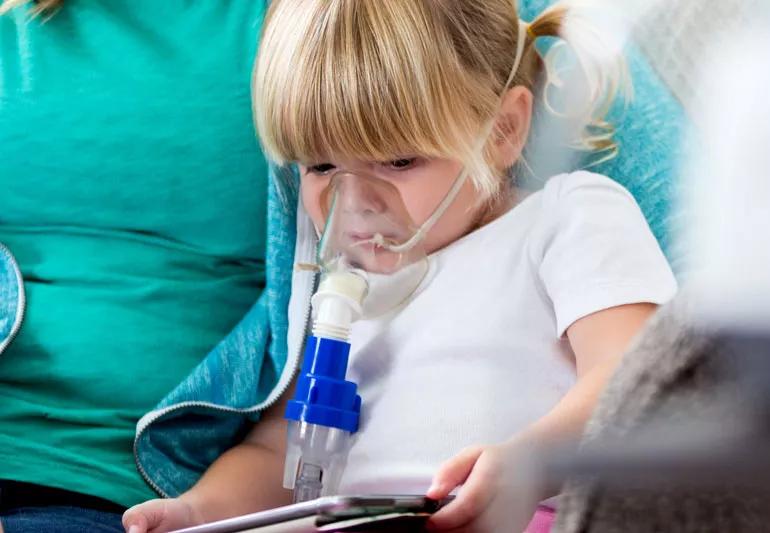Tips for finding care that helps kids grow and thrive

Image content: This image is available to view online.
View image online (https://assets.clevelandclinic.org/transform/305e823b-cd0f-4967-9f4d-7e1d4be72b56/childCysticFibrosis-637854524-770x533-1_jpg)
small child taking a breathing treatment
Cystic fibrosis is a lung disease that once claimed children’s lives before they started school. Thanks to advances in treatment, children with cystic fibrosis now survive well into their 30s, 40s and beyond.
Advertisement
Cleveland Clinic is a non-profit academic medical center. Advertising on our site helps support our mission. We do not endorse non-Cleveland Clinic products or services. Policy
But early diagnosis and treatment — followed by good, consistent care — are critical. How can you find care for your child that will help them grow and thrive?
Pediatric pulmonologist Nathan Kraynack, MD, shares five tips below.
Good care for cystic fibrosis begins with detection. Every state does newborn cystic fibrosis screening. If your baby tests positive, expect additional tests to determine whether they actually has the condition.
“About 90% of the newborns who screen positive are carriers and don’t actually have the condition,” explains Dr. Kraynack.
Bringing your child in promptly for follow-up testing will help doctors begin to plan his or her care. It’s also a good opportunity to discuss your fears and concerns as a parent.
If your child has cystic fibrosis, doctor surveillance is critical. Your physician should watch closely for signs of problems with the lungs or other systems.
Children who see their doctors frequently have better growth and lung function, and live longer.
“The standard of care is quarterly visits,” says Dr. Kraynack. “But because research shows more frequent visits improve outcomes, we like to see patients every two months.”
Because cystic fibrosis affects various parts of the body, a good program will provide care through a team approach. Expect your child’s team to include:
Advertisement
Because cystic fibrosis often leads to complications beyond the lung, it helps when your cystic fibrosis team has a strong working relationship with other specialists. “You want to look for collaborative care,” Dr. Kraynack says.
For a growing number of those with cystic fibrosis, medications that target genetic mutations can completely relieve symptoms in a matter of weeks.
“Early treatment with some of these medications can completely change the way the disease progresses,” Dr. Kraynack says. “New drugs that target more and more genes are always coming down the pike. So you’ll want to work with a team that is aware of and performs genetic testing.”
When young adults with cystic fibrosis prepare to leave home, it’s important to ensure that good care continues.
“Complications involving the lungs as well as the digestive and musculoskeletal systems can arise in adulthood,” Dr. Kraynack says. “So ideally, your team will have a formal transition process to help young adults move from pediatric into adult care.”
This process brings pediatric and adult providers together to share your child’s health history and bring ongoing health concerns to light.
“Follow these steps to ensure you’re getting good cystic fibrosis care for your child,” he says. “You’ll know you’re doing all you can to help them enjoy a longer, healthier life.”
Advertisement

Delivered every Tuesday!
Sign up for our Health Essentials emails for expert guidance on nutrition, fitness, sleep, skin care and more
It's a letter about the news!
Learn more about our editorial process.
Advertisement
Most recommended precautions center around minimizing bruising or swelling
Even one drink can have an impact on your cognitive function leading to slurred speech, blurred vision and impaired memory
Understand who may (and may not) benefit
Lorem ipsum dolor sit amet. Et odio Quis vel ipsam omnis eum alias deleniti et placeat impedit non voluptas galisum hic autem enim et cupiditate aliquid. Est beatae quidem non facilis autem ut commodi nisi aut tempore rerum et dolores voluptatem cum enim optio id sapiente quasi. Ad laboriosam officiis 33 cupiditate sequi ea voluptatum consectetur qui necessitatibus voluptate et quasi doloremque et facere explicabo quo explicabo officia
Seeking help through therapy can be an important step in improving your quality of life when you have UC
Type 2 diabetes isn’t inevitable with these dietary changes
Applying a hot or cold compress can help with pain
Pump up your iron intake with foods like tuna, tofu and turkey